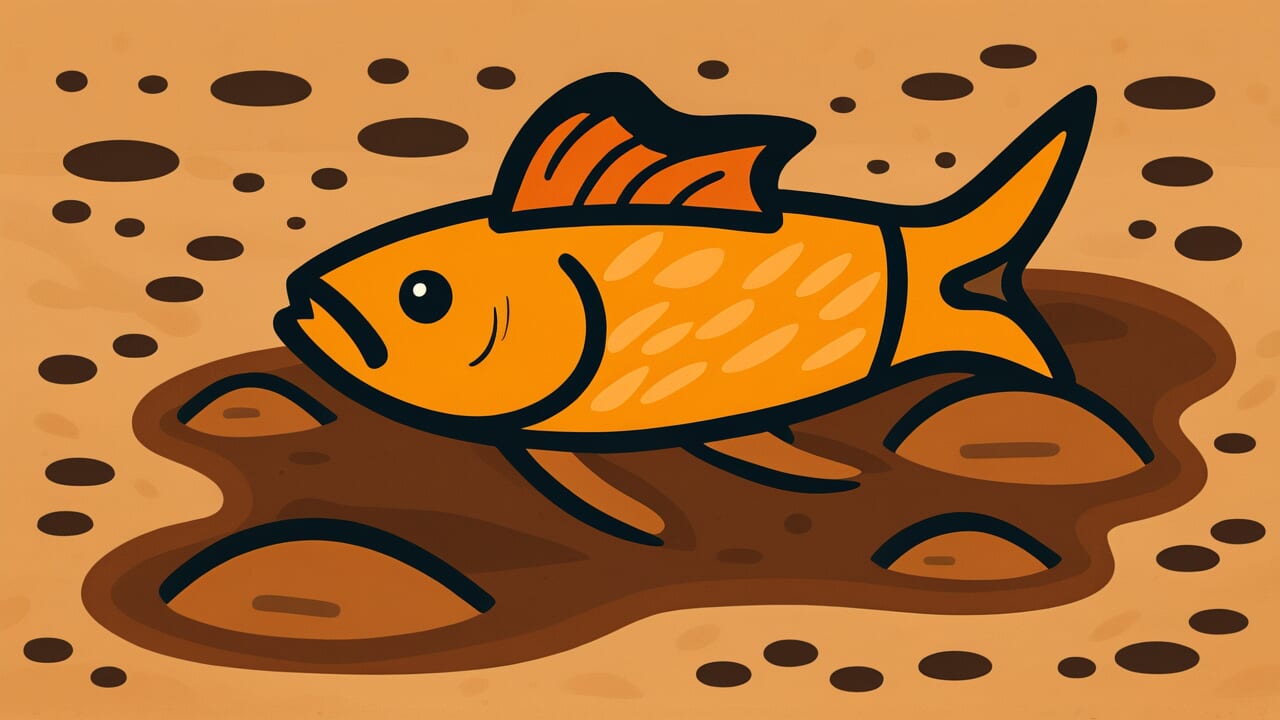How to Read “A crucian carp drunk on mud”
Doro ni yotta funa
Meaning of “A crucian carp drunk on mud”
“A crucian carp drunk on mud” is a proverb that describes someone struggling desperately, barely able to breathe.
It depicts a state of extreme pressure with no way out. The image comes from a crucian carp struggling in muddy water, suffering from lack of oxygen.
This proverb is used in various desperate situations. It applies when someone is drowning in debt and financial troubles.
It also describes being overwhelmed with work and having no breathing room. Or it can mean being mentally cornered and unable to think clearly.
This isn’t just about being “busy” or “troubled.” It expresses a much more critical situation where you feel like you’re about to suffocate.
In modern times, this vivid metaphor effectively describes being pushed to your physical and mental limits from overwork and stress.
It also captures the feeling of being paralyzed when problems pile up with no solution in sight.
Origin and Etymology
No clear written records explain the origin of this proverb. However, we can make interesting observations from the words themselves.
Crucian carp are freshwater fish that live widely in Japanese rivers and ponds. Common people have been familiar with them since ancient times.
These fish prefer relatively clean water. When water becomes murky or mud stirs up, they have trouble breathing.
Fish breathe by taking dissolved oxygen from water through their gills. In muddy water, oxygen becomes scarce.
Furthermore, mud clogs their gills. This severely reduces their breathing function.
The expression “drunk” likely describes the carp’s suffering in an oxygen-deprived state. It overlaps two images.
One is a drunk person who cannot think normally and staggers around. The other is a carp struggling near the water surface in muddy water, desperate for oxygen.
In rural areas, people actually witnessed such scenes. They saw it when draining rice paddies or after heavy rains muddied rivers.
Watching a living creature suffer in extreme conditions made a fitting metaphor. It naturally became established as a way to express human desperation.
Usage Examples
- With three deadlines overlapping, I’m truly like a crucian carp drunk on mud
- I can’t bear watching him become like a crucian carp drunk on mud, chased by debt repayments
Universal Wisdom
The proverb “A crucian carp drunk on mud” reflects the essential nature of humans when cornered.
Why was this proverb created and passed down through generations? Because it perfectly captures a universal human experience: suffering with no escape.
Humans naturally desire to move freely and live with choices. Yet sometimes we find ourselves unable to move, like a carp in muddy water.
Debt, illness, tangled relationships, work failures. The reasons vary, but they share one thing: a suffocating sense of pressure.
What’s interesting is that this proverb doesn’t simply say “suffering.” It uses the word “drunk.”
This suggests the loss of judgment that comes with being cornered. When truly suffering, people lose their composure and cannot think normally, just like being intoxicated.
Our ancestors understood this human weakness. At the same time, using these words helped others understand someone’s suffering.
It created opportunities for people to reach out and help. Human fragility and the kindness of acknowledging it together—both aspects are embedded in this proverb.
When AI Hears This
Crucian carp actually demonstrate remarkable survival abilities in low-oxygen environments.
In oxygen levels that would kill ordinary fish within hours, carp can survive for days or even weeks.
This isn’t mere endurance. They possess a special metabolic system that produces ethanol internally, allowing anaerobic respiration. So carp are literally “drunk” while adapting to muddy water.
What’s important here is that asking whether clear streams or muddy water is the superior environment is actually meaningless.
In ecological niche theory, each organism has its own environmental domain where it holds competitive advantages.
Clear streams have many faster fish, and food competition is fierce. But in muddy water, other fish avoid the environment.
That’s precisely why carp face fewer competitors and can actually live more safely.
We tend to judge by a single value standard: “clear stream = good, muddy water = bad.”
But looking at the entire ecosystem, diverse environments allow diverse organisms to coexist.
The carp’s satisfaction with mud isn’t foolishness. It might be a rational choice to find a place where its strengths shine.
A “good environment” measured by others’ values isn’t necessarily optimal for that individual.
Lessons for Today
This proverb teaches modern people the importance of maintaining their environment before reaching a desperate state.
A carp cannot clean the water itself. But we humans have the power to take action before the water turns muddy.
In modern society, various stresses hit us simultaneously: work, relationships, financial problems.
Each problem might be small individually. But when they pile up, you become like “a crucian carp drunk on mud.”
That’s why addressing problems while they’re still small matters. And most importantly, honestly asking for help when you’re suffering is crucial.
This proverb also promotes awareness of those around us. If someone appears like “a crucian carp drunk on mud,” it’s not mere laziness or weakness.
It might be a sign that they’re truly cornered and cannot breathe. At such times, even a little help to clear the water could save a life.
May you and those around you live in clear water.



Comments